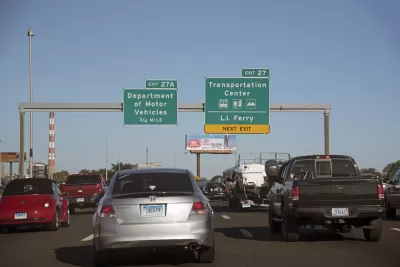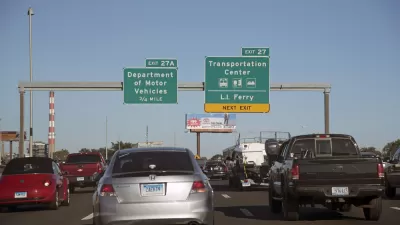Connecticut political leaders are heading toward a vote that would implement tolling on several of the state's highways to help fund transportation infrastructure projects around the state.

A proposal by Connecticut Governor Ned Lamont (D) would fund transportation infrastructure improvements with new electronic tolls on several of the state's busiest highways.
Keith Phaneuf reports:
With less than four weeks left in the legislative session, Gov. Ned Lamont made a bipartisan appeal for compromise on tolls. The Democratic governor pledged to dedicate more resources to transportation construction between now and 2024 — the first year toll receipts might be available.
More specifically:
The governor wants to put electronic tolls on interstates 84, 91 and 95 and on the Merritt Parkway with a base charge of 4.4 cents per mile — before discounts are offered to Connecticut motorists. This would raise $800 million per year for the budget by 2024, the administration says, with 30 to 40 percent coming from out-of-state motorists. Discounts would be provided to Connecticut residents and to frequent travelers.
Phaneuf provides more details of the political process that yielded the most recent deal, as does a separate article by Phaneuf published last week for a different publication. A previous article by Rachel Yonkunas and Kaitlyn Naples focuses on the governor's plan to improve the state's transportation infrastructure.
A hat tip to Angie Schmitt for sharing the Phaneuf article and providing perspective on the national significance of the proposal. Planetizen correspondent Irvin Dawid shared news of the Connecticut tolling debate back in February 2019.
FULL STORY: Lamont Willing To Compromise On Transportation — If Tolls Are Involved

Planetizen Federal Action Tracker
A weekly monitor of how Trump’s orders and actions are impacting planners and planning in America.

Maui's Vacation Rental Debate Turns Ugly
Verbal attacks, misinformation campaigns and fistfights plague a high-stakes debate to convert thousands of vacation rentals into long-term housing.

Restaurant Patios Were a Pandemic Win — Why Were They so Hard to Keep?
Social distancing requirements and changes in travel patterns prompted cities to pilot new uses for street and sidewalk space. Then it got complicated.

In California Battle of Housing vs. Environment, Housing Just Won
A new state law significantly limits the power of CEQA, an environmental review law that served as a powerful tool for blocking new development.

Boulder Eliminates Parking Minimums Citywide
Officials estimate the cost of building a single underground parking space at up to $100,000.

Orange County, Florida Adopts Largest US “Sprawl Repair” Code
The ‘Orange Code’ seeks to rectify decades of sprawl-inducing, car-oriented development.
Urban Design for Planners 1: Software Tools
This six-course series explores essential urban design concepts using open source software and equips planners with the tools they need to participate fully in the urban design process.
Planning for Universal Design
Learn the tools for implementing Universal Design in planning regulations.
Heyer Gruel & Associates PA
JM Goldson LLC
Custer County Colorado
City of Camden Redevelopment Agency
City of Astoria
Transportation Research & Education Center (TREC) at Portland State University
Jefferson Parish Government
Camden Redevelopment Agency
City of Claremont




























